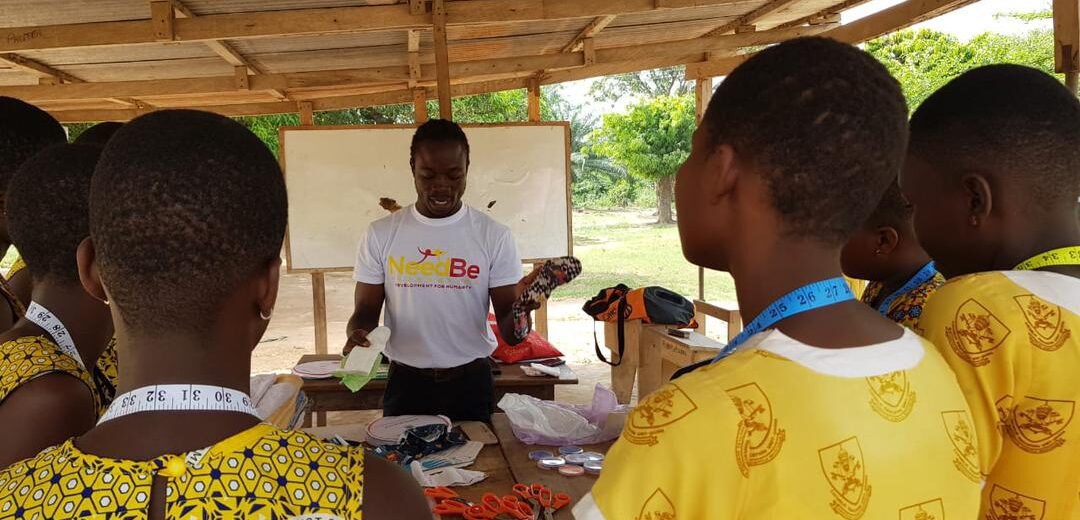
Winning the battle against menstrual poverty
In a world where access to menstrual hygiene products remains a challenge for many young girls, Samuel Dzomeku’s unwavering dedication has brought hope for females. Returning to Ghana from the United Kingdom with a vision to find a lasting way to recycle sanitary pads to save cost, Samuel did not just spread awareness about menstrual hygiene; he ignited a revolution, one reusable pad at a time.
From the northern belt to the busy streets of Greater Accra, from the historic Ashanti Region to the beautiful landscapes of the Volta Region, his outreach extended far and wide. Across Ghana, approximately 5000 girls have felt the tangible benefits of Samuel’s initiative. Touched by this story, I decided to follow Samuel to one of the communities who have benefitted from this project, Ayikuma, in the Greater Accra region of Ghana to engage some beneficiaries.
UNESCO on Menstruation
According to the United Nations Educational, Scientific and Cultural Organization (UNESCO), one out of every ten girls in sub-Saharan Africa miss school during their menstrual period, equating to approximately 20 percent of a given school year.
It also uncovered that in Ghana, nine out of ten girls are unable to attend school due to menstruation.
Menstrual poverty
Menstruation is an unavoidable voyage for every girl child and young woman. Unfortunately, not every girl child has the luxury to afford the crucial tools particularly disposable sanitary pads to make the journey a hygienic one. Due to financial constraints, some girls use crude alternatives like cloth, leaves and in some extreme cases polythene bags to collect the blood that ejects from their bodies. For some, they have to give their bodies to men to afford pads.
Passion for change
Samuel Dzomeku is a 31-year-old whose passion for helping young girls acquire a hygienic menstrual journey was begotten when he embarked on a three-month volunteer program in 2014. At Abrobiano, the town in which he volunteered, Samuel observed that about 80 percent of the school girls missed school during their period due to a lack of pads.
Inspired by his observation, Samuel who was on a self-discovery at the time said he finally found his purpose.
“I together with some volunteers went to a school in Abrobiano, a town near Komenda in the Central Region of Ghana one time to teach. When we got to school that day, a lot of girls had not come to school. So we asked why many of the girls were absent and we were informed that most of the girls missed school during their menses. It was due to a lack of menstrual materials for girls in the community that some tend to stay at home during their menstrual period”.
Samuel continued “This really pierced my heart. I thought to myself that this would be a very good project for me to venture. Already, I had received a revelation to impact lives in communities.
And that became a serious burden. I saw it in my dreams. Lo and behold a volunteer friend from Switzerland returned to the country. I told her about it and since she was training to become a doctor, she bought into the idea and we planned a menstrual hygiene program,” he narrates.
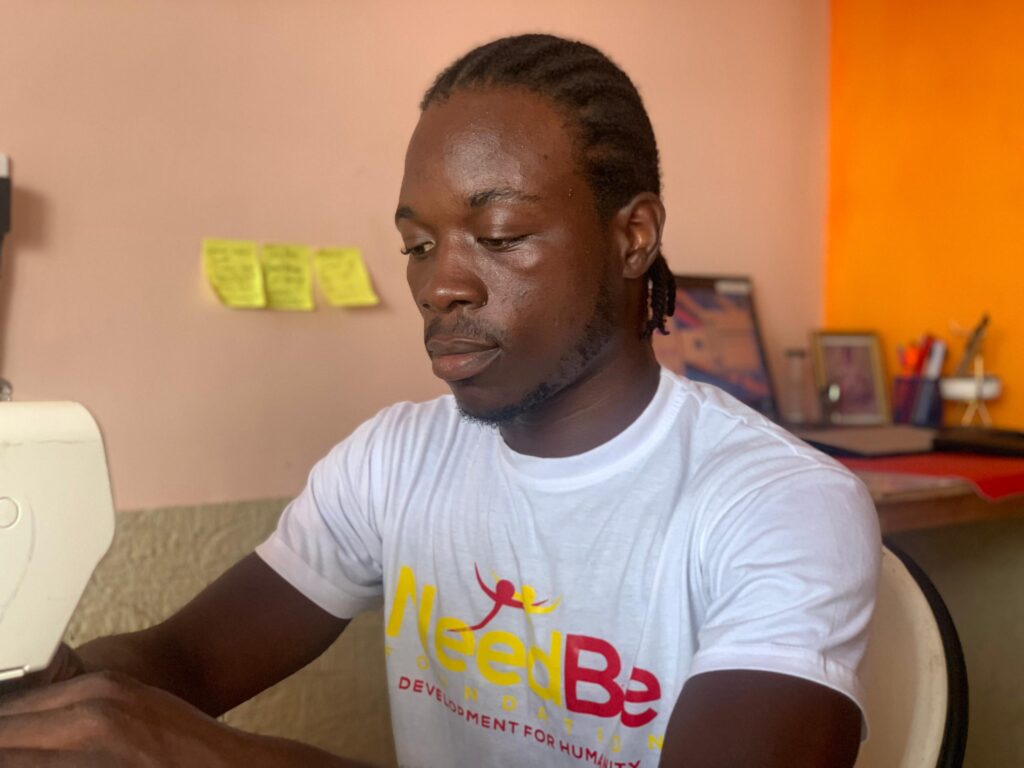
31-year-old Samuel in 2014 discovered his purpose and later set out to change the skyrocketing figures of menstrual poverty in Ghana.
In 2017, Samuel and his friend from Switzerland embarked on the first outreach in Adaklu Waya of the Volta Region. The turnout was massive and the feedback from participants was great. However, the crux of the issue was still unresolved, the availability of sanitary pads.
“We realized that after we left they complained about the lack of resources to purchase disposable pads every month. So these girls tend to use other materials for menstruation, and some also rely on boys to get some funding for pads,” he said.
Nonetheless, it took another three years for Samuel to discover this sustainable material for girls and young women who could not afford disposable pads each month.
Journey for solutions
In the year 2020, Samuel was fortunate to embark on a one-year volunteer program in the United Kingdom and that was where he learned about reusable pads.
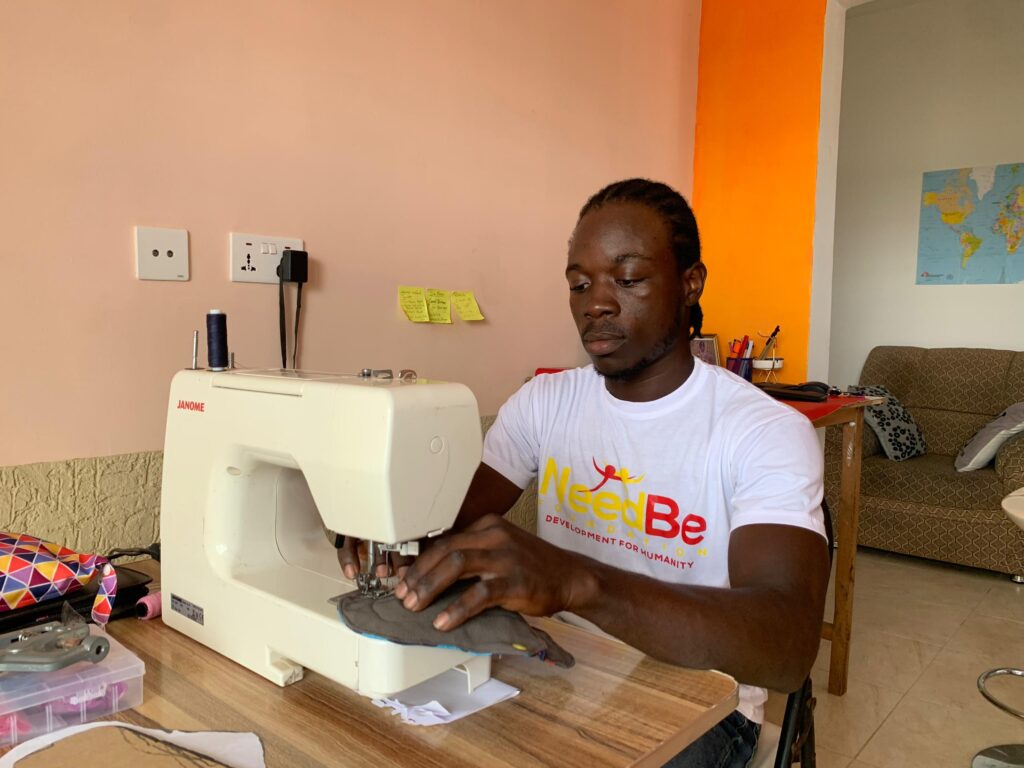
Samuel discovered on his trip to UK that reusable pads was a more sustainable way to resolve menstrual poverty.
The menstrual hygiene advocate studied everything that ought to be studied about it and self-taught himself how to make these reusable pads.
“I got a sewing machine and I sewed in my room each night after work. One time, I put the finished work on a UK scout page that I was on. Two people sent me sewing machines and some fabrics. I got some of my colleagues after work to help me make more pads. I did all this in the UK, so when I was returning to Ghana, I had one bag full of pads together with my luggage,” he said.
Support for young females.
Samuel upon his return went back to the Adaklu District again. This time he didn’t just create awareness about menstrual hygiene, he transformed the menstrual journey of about 30 girls in the two communities he visited.
Each beneficiary received four reusable pads. According to him, “They can use it for three to four years if they take care of them.”
However, the zealous young man believes there is only little he can do if he continues to ‘fish for beneficiaries’. Given that, Samuel rolled out an initiative last year called the Paddaton Project where he taught about 15 young girls in Ayikuma a rural community in Accra, Ghana on how to make the reusable pads themselves.
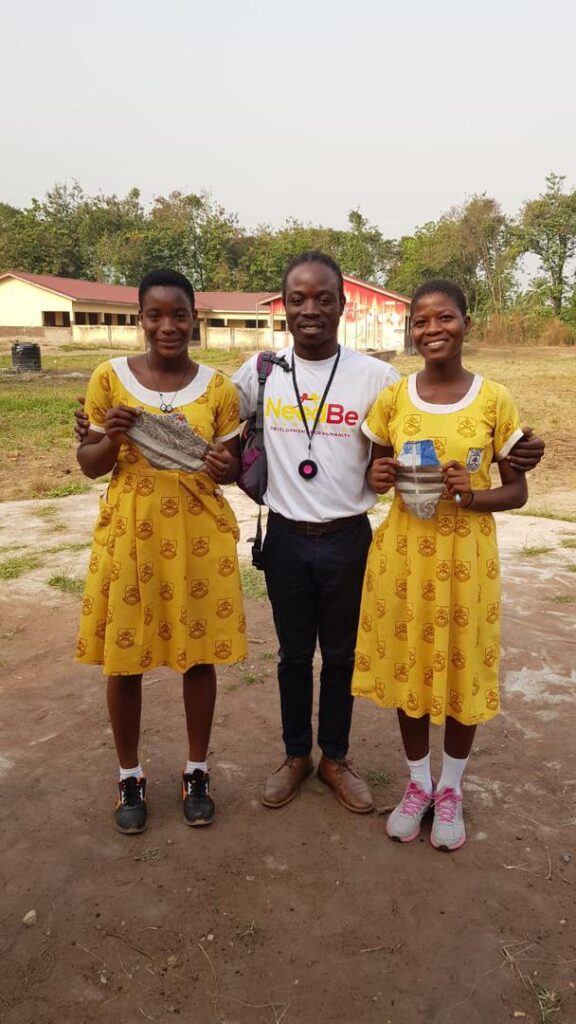
Samuel under Project Paddaton taught students in various Junior High Schools in Ayikuma how to make their own reusable pads. Photo Credit: Needbe Foundation
My encounter with Theresa
In a video shown to me, Theresa Adovor sits under a shed as the soft sunlight casts its gentle rays on the wooden table where she works. Her face is a picture of concentration, brows slightly furrowed in determination as she cautiously maneuvers the needle and thread through a fabric.
With gentle fingers, Theresa guides the needle through the material, each stitch precise and calculated. She aims to make a reusable sanitary pad. Occasionally, she pauses to adjust her position or inspect her work, her eyes scanning over the cloth with a critical gaze. The then 16-year-old was learning how to make reusable sanitary pads.
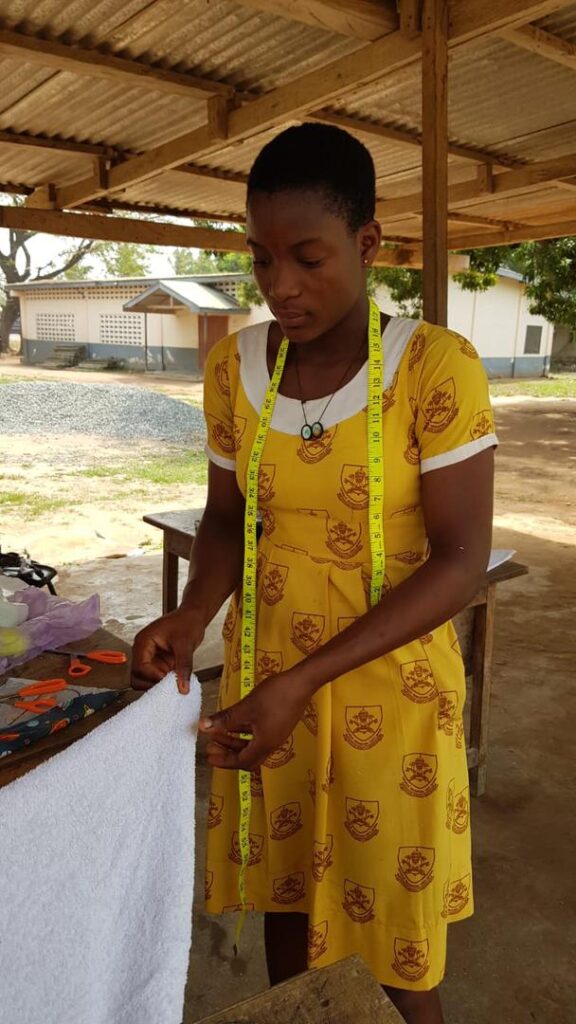
Theresa approaches reusable pad training with a strong sense of dedication and seriousness. Photo Credit: Needbe Foundation
Growing up in a home with three sisters and two brothers; being raised by a single mother, disposable sanitary pads are a luxury. Hence, the Form One student of Ayikuma R/C Basic School resorted to cloth when menstruating.
“My mom could not afford the pads, so I had to use rags,” she recounts.
Theresa is one of the many girls in Ghana who are forced to use alternative methods when menstruating due to poverty.
For Theresa, despite the use of rags, she tries not to miss school. However, on days she attends class, her confidence level is at an all-time low during her period. A situation the now 17-year-old claims has changed since she was taught how to make reusable sanitary pads in 2023 by a benevolent individual.
She said the burden on her mother to provide pads for her and her three sisters is now a thing of the past. After having learned the sewing of reusable pads, Theresa says she has since made eight more and shared them with her siblings.
With a big smile plastered on his face, Samuel says, comments like these are what makes all the tassel he goes through in running this Foundation worthwhile.
“It has been challenging putting resources and people together. But anytime I take the finished product, I feel very happy. I feel that I have achieved my purpose. And that is exactly, what I feel when I see the smiles on the faces of the girls I have helped.”
Myths surrounding reusable pads.
Among the challenges Samuel faces, are the myths surrounding reusable pads. Despite its sustainability and eco-friendly nature, many associate it with rags, and tag it as unhygienic.
However, Ruth Katamanso, the Women’s Health Nurse Specialist at the Shai-Osudoku District Hospital in Accra begs to differ. She believes reusable pad is the future.
“Previously, our mothers used the cloth during menstruation but they lacked the knowledge as to how to maintain it. When reusable pads were introduced, people saw it to be old, archaic and old-fashioned. But in our part of the world where poverty is a bit high when educating the girls about how to wash, maintain, and reuse it, they embrace it. So reusable pads are not old-fashioned, I just think our mothers lacked the hygienic way of it. This is a good idea, and it will help sustain menstrual hygiene,” she explains.
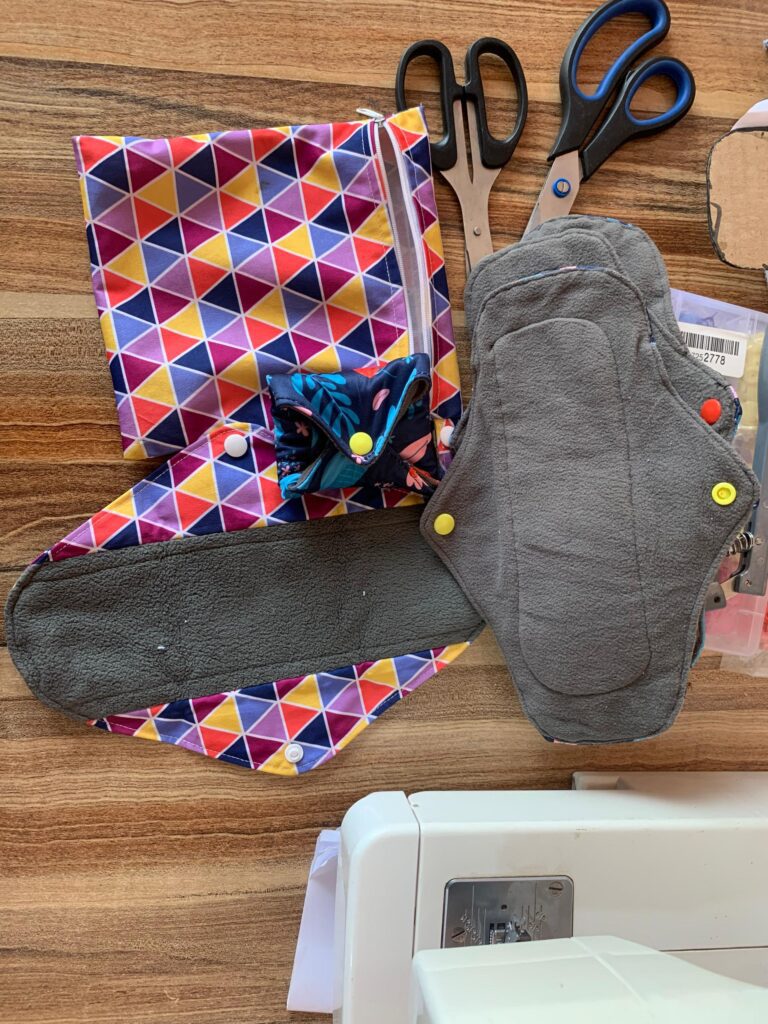
The Women’s Health Nurse Specialist at the Shai-Osudoku District Hospital believes reusable pads are the future.
According to her, although disposable pads are universal, many do not know how to dispose them properly. This irresponsible practice, she says, is gradually impacting the environment. A looming danger, she believes, can be averted should the reusable pads be embraced by all and sundry.
“With these reusable pads, you wash them hygienically, and you hang and reuse them. And even if you have to dispose it off, it won’t have blood in it, you’ll still wash it first. So I think it is going to help with protecting the environment.”
Exciting future
Meanwhile, Theresa is happier and more confident during her menstrual journey. “Initially I was very shy to hang my rags outside to dry. But since I started using reusable pads, I can take them outside now.”
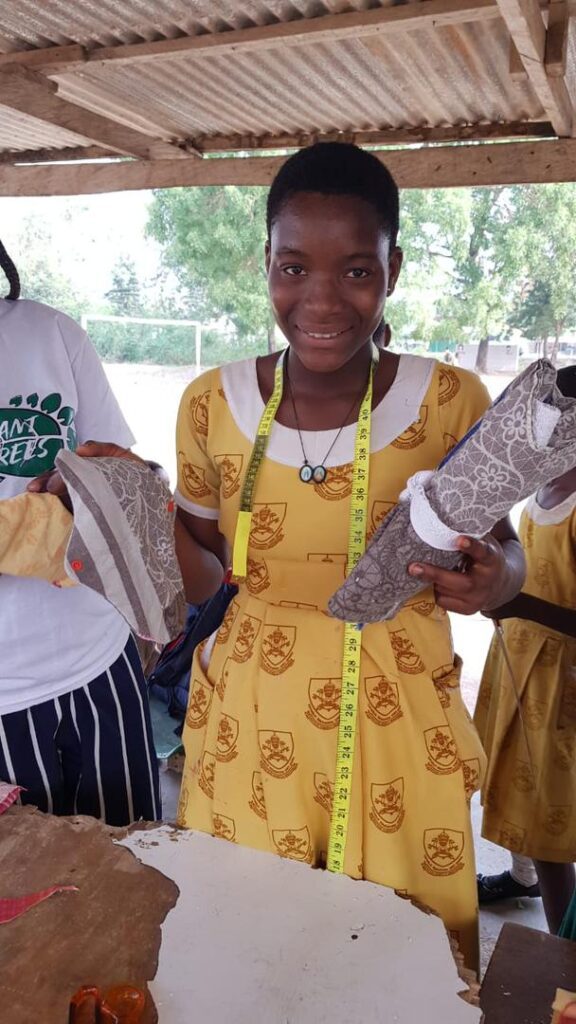
Since her encounter with Samuel, Theresa has become more confident during menstrual journey. Photo Credit: Needbe Foundation
For Samuel, this is not the end of the road. Touching Theresa’s life is just one. He wishes to leave an indelible mark in the lives of as many girls as possible. With engagements underway to set up three production hubs in various parts of the country, Samuel is confident that he is a step closer to transforming the lives of school girls who cannot afford to menstruate.
“Let us leave legacies so that when we die tomorrow, we will remember,” he says with a cheerful smile.
In his own small way, Samuel is contributing to achieving the United Nation’s SDG Goal 3 – Good Health and Wellbeing.
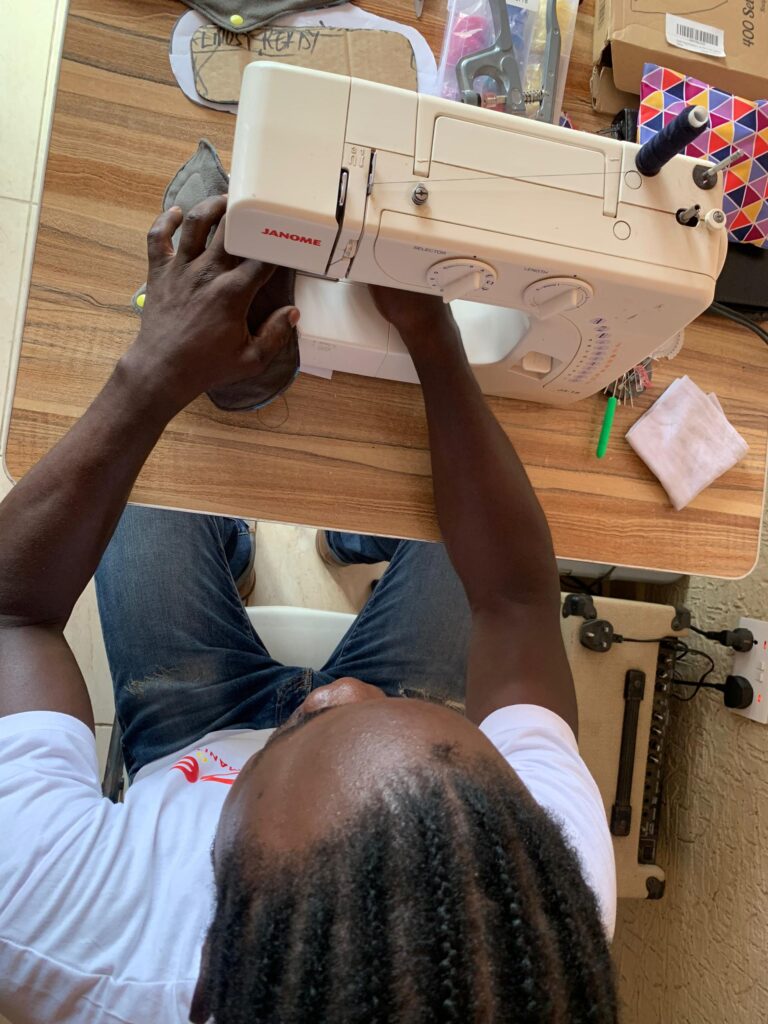

Leave a Reply